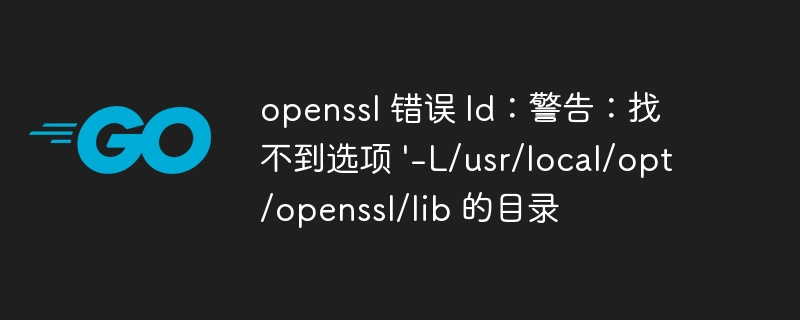 Backend Development
Backend Development
 Golang
Golang
 openssl error ld: warning: directory not found for option '-L/usr/local/opt/openssl/lib'
openssl error ld: warning: directory not found for option '-L/usr/local/opt/openssl/lib'
openssl error ld: warning: directory not found for option '-L/usr/local/opt/openssl/lib'

php editor Banana encountered an error when using openssl, prompting "ld: warning: option '-L/usr/local/opt/openssl/lib' not found Table of contents". This error is usually caused by the openssl library file path being incorrectly configured. The solution to this problem is to add the correct openssl library file path in the compilation options.
Problem content
An error occurred while compiling the tdlib program related to openssl call.
/opt/homebrew/opt/go/libexec/pkg/tool/darwin_arm64/link: running cc failed: exit status 1 ld: warning: directory not found for option '-L/usr/local/opt/openssl/lib' ld: library not found for -lssl clang: error: linker command failed with exit code 1 (use -v to see invocation)
openssl is installed with brew:
which openssl /opt/homebrew/bin/openssl
==> openssl@3: stable 3.1.2 (bottled) Cryptography and SSL/TLS Toolkit https://openssl.org/ /opt/homebrew/Cellar/openssl@3/3.1.2 (6,495 files, 28.4MB) * Poured from bottle using the formulae.brew.sh API on 2023-09-21 at 14:06:03 From: https://github.com/Homebrew/homebrew-core/blob/HEAD/Formula/o/[email protected] License: Apache-2.0
I tried using pkg-config and exposing the next environment to resolve this issue, but nothing helped.
export CGO_CFLAGS=$(pkg-config --cflags openssl) export CGO_LDFLAGS=$(pkg-config --libs openssl)
Workaround
Can you also check these flags (.~/bashrc or ~/.zshrc):
export CGO_CFLAGS="-I/opt/homebrew/include" export CGO_LDFLAGS="-L/opt/homebrew/lib -lssl -lcrypto"
Or you can use pkg-config:
export CGO_CFLAGS="$(pkg-config --cflags openssl)" export CGO_LDFLAGS="$(pkg-config --libs openssl)"
The above is the detailed content of openssl error ld: warning: directory not found for option '-L/usr/local/opt/openssl/lib'. For more information, please follow other related articles on the PHP Chinese website!

Hot AI Tools

Undresser.AI Undress
AI-powered app for creating realistic nude photos

AI Clothes Remover
Online AI tool for removing clothes from photos.

Undress AI Tool
Undress images for free

Clothoff.io
AI clothes remover

AI Hentai Generator
Generate AI Hentai for free.

Hot Article

Hot Tools

Notepad++7.3.1
Easy-to-use and free code editor

SublimeText3 Chinese version
Chinese version, very easy to use

Zend Studio 13.0.1
Powerful PHP integrated development environment

Dreamweaver CS6
Visual web development tools

SublimeText3 Mac version
God-level code editing software (SublimeText3)

Hot Topics
 How do you use the pprof tool to analyze Go performance?
Mar 21, 2025 pm 06:37 PM
How do you use the pprof tool to analyze Go performance?
Mar 21, 2025 pm 06:37 PM
The article explains how to use the pprof tool for analyzing Go performance, including enabling profiling, collecting data, and identifying common bottlenecks like CPU and memory issues.Character count: 159
 How do you write unit tests in Go?
Mar 21, 2025 pm 06:34 PM
How do you write unit tests in Go?
Mar 21, 2025 pm 06:34 PM
The article discusses writing unit tests in Go, covering best practices, mocking techniques, and tools for efficient test management.
 How do I write mock objects and stubs for testing in Go?
Mar 10, 2025 pm 05:38 PM
How do I write mock objects and stubs for testing in Go?
Mar 10, 2025 pm 05:38 PM
This article demonstrates creating mocks and stubs in Go for unit testing. It emphasizes using interfaces, provides examples of mock implementations, and discusses best practices like keeping mocks focused and using assertion libraries. The articl
 How can I define custom type constraints for generics in Go?
Mar 10, 2025 pm 03:20 PM
How can I define custom type constraints for generics in Go?
Mar 10, 2025 pm 03:20 PM
This article explores Go's custom type constraints for generics. It details how interfaces define minimum type requirements for generic functions, improving type safety and code reusability. The article also discusses limitations and best practices
 How can I use tracing tools to understand the execution flow of my Go applications?
Mar 10, 2025 pm 05:36 PM
How can I use tracing tools to understand the execution flow of my Go applications?
Mar 10, 2025 pm 05:36 PM
This article explores using tracing tools to analyze Go application execution flow. It discusses manual and automatic instrumentation techniques, comparing tools like Jaeger, Zipkin, and OpenTelemetry, and highlighting effective data visualization
 Explain the purpose of Go's reflect package. When would you use reflection? What are the performance implications?
Mar 25, 2025 am 11:17 AM
Explain the purpose of Go's reflect package. When would you use reflection? What are the performance implications?
Mar 25, 2025 am 11:17 AM
The article discusses Go's reflect package, used for runtime manipulation of code, beneficial for serialization, generic programming, and more. It warns of performance costs like slower execution and higher memory use, advising judicious use and best
 How do you use table-driven tests in Go?
Mar 21, 2025 pm 06:35 PM
How do you use table-driven tests in Go?
Mar 21, 2025 pm 06:35 PM
The article discusses using table-driven tests in Go, a method that uses a table of test cases to test functions with multiple inputs and outcomes. It highlights benefits like improved readability, reduced duplication, scalability, consistency, and a
 How do you specify dependencies in your go.mod file?
Mar 27, 2025 pm 07:14 PM
How do you specify dependencies in your go.mod file?
Mar 27, 2025 pm 07:14 PM
The article discusses managing Go module dependencies via go.mod, covering specification, updates, and conflict resolution. It emphasizes best practices like semantic versioning and regular updates.





